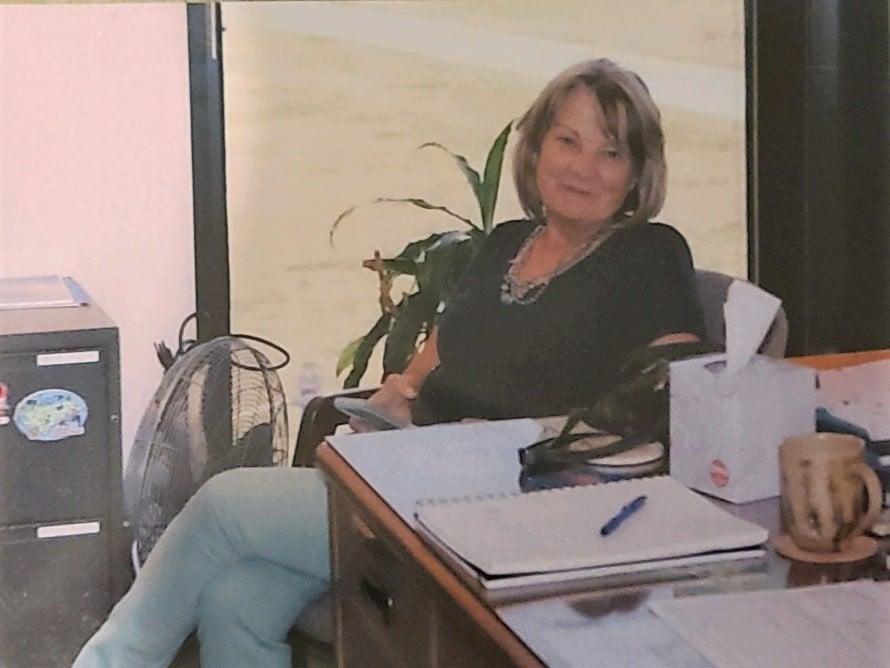Becky Lewis worked in the wastewater field for 32 years. She started her career as a laboratory technician and retired from her position as Water Resources & Recovery Division Manager a few months ago. Tonya Bronleewe from the Environmental Finance Center at Wichita State University wanted to hear from Becky about how the industry has changed over the years, especially for women; and what she sees for the next generation of the wastewater workforce. Below are Becky’s insights, wisdom, and challenges to the wastewater industry.
Tonya Bronleewe: What was it like being a woman in the wastewater field at the beginning of your career?
Becky Lewis: When I first started working in the wastewater field, women and men mostly worked in “traditional roles.” Men worked field and engineering positions, while women worked in customer service and secretarial positions. Managerial positions were almost always held by men.
The laboratory was one of the few places where there appeared to be a more even distribution of men and women. However, even in the lab setting, men seemed to have the leadership roles – chemist or laboratory director versus lab technician.
Early on, overt sexist comments were common. One example is when one of the men who worked in the field would come in and look at our breasts and say, “you have nice eyes.” In the early days, many of the calendars posted in the maintenance area were of scantily dressed women. I recall in the mid-nineties; a memo came out requiring that the calendars be taken down.
TB: How have things changed?
BL: There is definitely a more diverse workforce, especially in the technical fields such as laboratories and engineering, and there are more women in senior management positions. One example of this is associated with a biological nutrient removal project I worked on before I retired. The engineering design project is being led by two excellent project managers who happen to be women.
Another great example of how wastewater is becoming more diverse can be seen at our professional conferences. When I first started my career and attended a wastewater conference, I could quickly get in and out of the restroom during conference breaks. Now there is a waiting line! I love it! Even waiting in line for a bathroom, the women of wastewater continue to discuss business opportunities, as well as their personal lives. I have not seen a risqué calendar or poster in the shop for a very long time!
While overt sexist comments are rare, in my experience, in many wastewater work places sexism still exists. I sometimes see this today when senior management questions female managers’ judgement more often than their male colleagues, or assuming a woman holds a less senior role. I recall being in a senior management meeting, when the department director informed me that I was the Department’s token female. He said it as a joke, but it was not funny to me. I saw my male counterparts get invited to golf outings, hunting trips and sports games more often than I was invited. I think that is slowly changing.
TB: How can we talk about wastewater careers to recruit the next generation?
BL: It seems that young people are looking for careers that make the world a better place to live. Pay may not be the main driver. Employees want to hear about how their work makes a positive impact on their local or global community.
A few messages to share with them could be:
- Careers in water resource recovery protect local waterways and the health of the plants, animals, and people downstream.
- The wastewater treatment process generates solids that can be used as soil amendments or green fertilizer.
- Biogas can be captured from the treatment process for energy.
- During the pandemic, wastewater moved into the forefront as a community health tool as epidemiologists used wastewater surveillance to identify and anticipate COVID-19 outbreaks. How cool to provide real time information to our public health providers that enables them to communicate to the public, medical facilities, and businesses so they can consider proactive preventative measures!
The wastewater field encompasses many niches; mechanical, computer programming, biological and chemical analyses, engineering, accounting, regulatory inspection, marketing, to name a few. Anywhere you go, there is typically a wastewater plant, so if you like to travel, there is typically a job waiting at your destination.
Most people don’t realize that wastewater workers have to be adaptable and critical thinkers. Like many jobs, some days are pretty mundane, but fast and effective decisions need to be made during power losses, storms, or a significant infrastructure failure. And, to be resilient and ready to rebound from these extreme events, planning and preparing is an important part of the job and is vital to keeping our communities safe.
TB: What advice do you have for new wastewater professionals?
BL:
- Know that wastewater work which is often not seen and can be taken for granted by the public, but your work is so very valuable.
- Take advantage of leadership classes, especially ones that promote equitable opportunities.
- Work with ambition, but do not sacrifice your values.
TB: What would you have liked to know when you started your career that you learned along the way?
BL: No matter how hard you and your team work or how well you plan the project, sometimes we fail. And that’s okay. Learn from mistakes. Figure out another way if it is important, and if not, move on. If something doesn’t work the first time, maybe it is not the right time, but at a later season, it may be successful.
Don’t sacrifice your core values or your team to navigate your career path.
Always take the opportunity to mentor others or be mentored.

